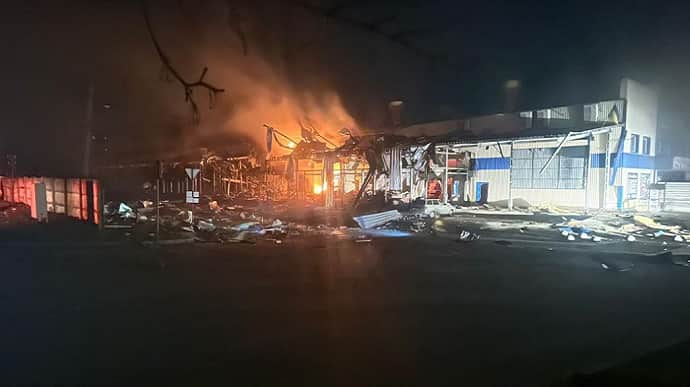Daily Flyer - December 20, 2023
A voice of Ukraine to the West

Three humanitarian organisations suffer from Russian attack on Kherson

Kherson, Ukraine – In a distressing turn of events, the humanitarian situation in Kherson has taken a severe hit as Russian attacks overnight on December 19-20 resulted in the destruction of warehouses belonging to two humanitarian organizations and the damage of another.
Denise Brown, the humanitarian coordinator in Ukraine, expressed horror at the latest wave of indiscriminate strikes by the Russian Federation. The Ukrainian Red Cross Society and the local NGO Shchedryk saw their warehouses burned to the ground, annihilating crucial relief supplies. Additionally, the international NGO HEKS/EPER faced significant damage to its facilities.
Indiscriminate attacks on civilian areas, including those housing humanitarian organizations, are strictly prohibited under international humanitarian law. Brown emphasized that these attacks not only compromise the ability of humanitarian organizations to provide assistance but also deprive civilians of access to crucial aid when they need it the most.
In a statement, Brown remarked, "The people of Kherson – and those living along the entire front line in the east and south – are, indeed, bearing the brunt of this war. The level of destruction is massive, and, with the onset of winter, aid is as necessary as ever."
HEKS/EPER, despite reporting damage to its office, pledged to continue its work and assist the most vulnerable populations in the face of adversity.
These attacks mark a concerning escalation of hostilities, adding to the challenges faced by the already beleaguered residents of Kherson and underscoring the urgent need for international intervention to protect civilians and humanitarian efforts in the region. The international community is called upon to condemn these actions and work towards a peaceful resolution to the conflict.
US to not vote on assistance to Ukraine until 2024
In a setback to the timeline for critical legislative action, leaders from both parties in the U.S. Senate have confirmed that a vote on a package aimed at providing aid to Ukraine and bolstering border security will be deferred until early next year.
Senate Democratic Leader Chuck Schumer emphasized that negotiators would be working diligently during the December and January break period, expressing the goal to finalize the package soon after returning. However, Republican Senator John Thune asserted that a deal would not be reached until January 2024, citing the Democrats' approach as a factor that has made it impossible to pass a substantive border security deal before Christmas.
While Schumer and Senate Republican Leader Mitch McConnell issued a joint statement noting "encouraging progress," they also acknowledged that "challenging issues remain." The complexity of the negotiations was underscored by Senator Kyrsten Sinema, an independent senator actively involved in the talks, who described the situation as "the most complicated area of American law."
The aid package, designed to support Ukraine in its ongoing conflict with Russia, and the provisions for strengthening U.S. border security, are critical components that require careful consideration and bipartisan consensus. The delay in the Senate vote reflects the intricate nature of the negotiations and the need for additional time to address the complexities involved.
As the situation unfolds, the international community awaits the outcome of these negotiations, recognizing the significance of U.S. support for Ukraine and the importance of robust border security measures in the current geopolitical landscape.
Military proposes to mobilize 450,000-500,000 new soldiers, Zelensky says
In a year-end press conference held in Kyiv, President Volodymyr Zelensky revealed that Ukraine's military leadership has proposed a mobilization plan to enlist 450,000-500,000 additional conscripts. While acknowledging the seriousness of the proposal, Zelensky emphasized the need for concrete information and clarity on several key issues before lending his support.
President Zelensky had previously instructed Commander-in-Chief Valerii Zaluzhnyi and Defense Minister Rustem Umerov to develop a new mobilization plan, with the aim of bolstering Ukraine's defense capabilities. During the press conference, Zelensky highlighted the importance of addressing issues related to the rotation and demobilization of troops, ensuring fairness for soldiers on the front line and taking into account their morale.
Expressing the financial implications of the proposed mobilization, President Zelensky stated that the plan would cost approximately Hr 500 billion ($13.4 billion). The significant budgetary allocation underscores the magnitude of the proposed mobilization and its potential impact on the country's resources.
When questioned about the possibility of mobilizing women, Zelensky firmly stated, "As for (the mobilization of) women – no, I will not sign it." However, he expressed openness to considering the mobilization of 25-year-old men, emphasizing the need for clear and compelling arguments to support such a move.
As the Ukrainian leadership deliberates on the mobilization plan, the international community closely observes the developments, recognizing the critical role of Ukraine's defense forces in the context of ongoing geopolitical challenges. The decision to mobilize additional conscripts is contingent on addressing key logistical, strategic, and financial considerations in the interest of national security.

